Welcome to the Essential Guide to Disease Management for Backyard Poultry Owners! Keeping backyard poultry can be a rewarding experience, but it also comes with its own set of challenges, particularly in maintaining the health of your flock. In this comprehensive guide, we’ll cover everything you need to know to keep your feathered friends healthy and happy. From vaccination schedules and biosecurity practices to recognizing illness and providing first aid, we’ll equip you with the knowledge and tools to prevent and manage common diseases.
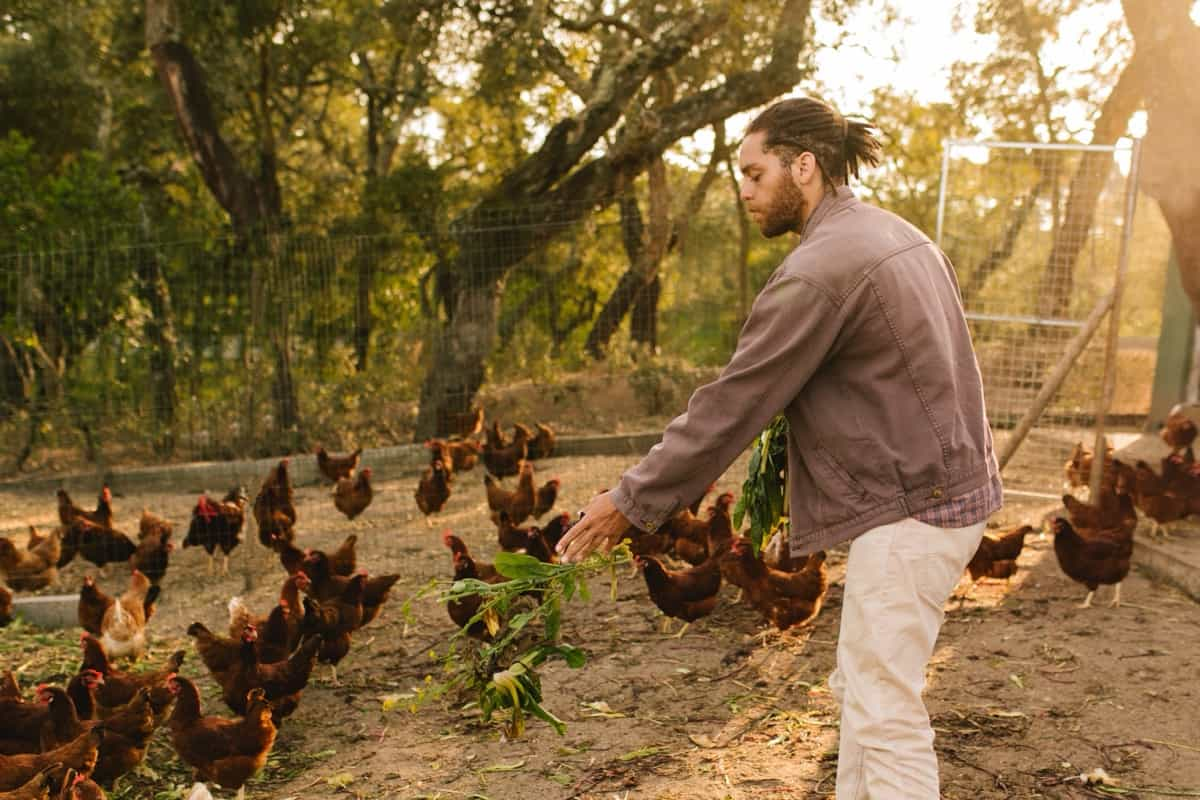
Disease Management for Backyard Poultry
Introduction to Backyard Poultry Disease Management
Backyard poultry disease management involves implementing proactive measures to prevent, recognize, and treat illnesses in your flock. This includes vaccination schedules, biosecurity practices, sanitation in coops, parasite control, and providing proper nutrition. By prioritizing disease prevention and prompt treatment, maintain the health and well-being of your backyard poultry.
Understanding the Importance of Disease Prevention
Disease prevention is the best way to ensure the health and happiness of your backyard flock. Preventing diseases can save you time, money, and stress, as well as protect your birds from suffering and death. Disease prevention can also reduce the chances of spreading diseases to other poultry, wildlife, or humans. Some diseases, like avian influenza and salmonella, are zoonotic, which means they can be transferred between animals and people. By preventing diseases in your backyard poultry, you are also protecting yourself and your community.
Overview of Common Poultry Diseases
Backyard poultry can be affected by diseases ranging from mild to severe, acute to chronic, and infectious to non-infectious. Common diseases include Coccidiosis, Marek’s disease, fowl pox, Newcastle disease, infectious bronchitis, infectious laryngotracheitis, mycoplasmosis, erysipelas, and fowl cholera. Coccidiosis is a parasitic infection that causes diarrhea, weight loss, and dehydration in young birds.
Marek’s disease is a viral infection that causes tumors, paralysis, and blindness, which can be prevented by vaccinating chicks at hatch. Fowl pox causes skin scabs and lesions, and Newcastle disease causes respiratory distress, nervous signs, and egg production drop. Infectious bronchitis causes respiratory problems, sneezing, coughing, and reduced egg quality. Infectious laryngotracheitis causes severe respiratory distress, bloody mucus, and coughing.
Mycoplasmosis bacterial infection that causes respiratory problems, swollen joints, and reduced egg production. Erysipelas causes skin lesions, arthritis, septicemia, and death. Fowl cholera is a bacterial infection that causes fever, diarrhea, septicemia, and death. Regular vaccinations and controlling insect vectors can prevent these diseases.
Setting Up a Healthy Environment
Choosing the Right Location for Your Coop
Your coop should be located in a well-drained area that is protected from predators, pests, and extreme weather. It should also be away from sources of pollution or contamination, such as garbage dumps or sewage systems. You should also avoid placing your coop near other poultry or livestock farms to prevent cross-infection.
In case you missed it: Maximizing Health and Productivity with Precision Nutrition Strategies for Poultry Farming
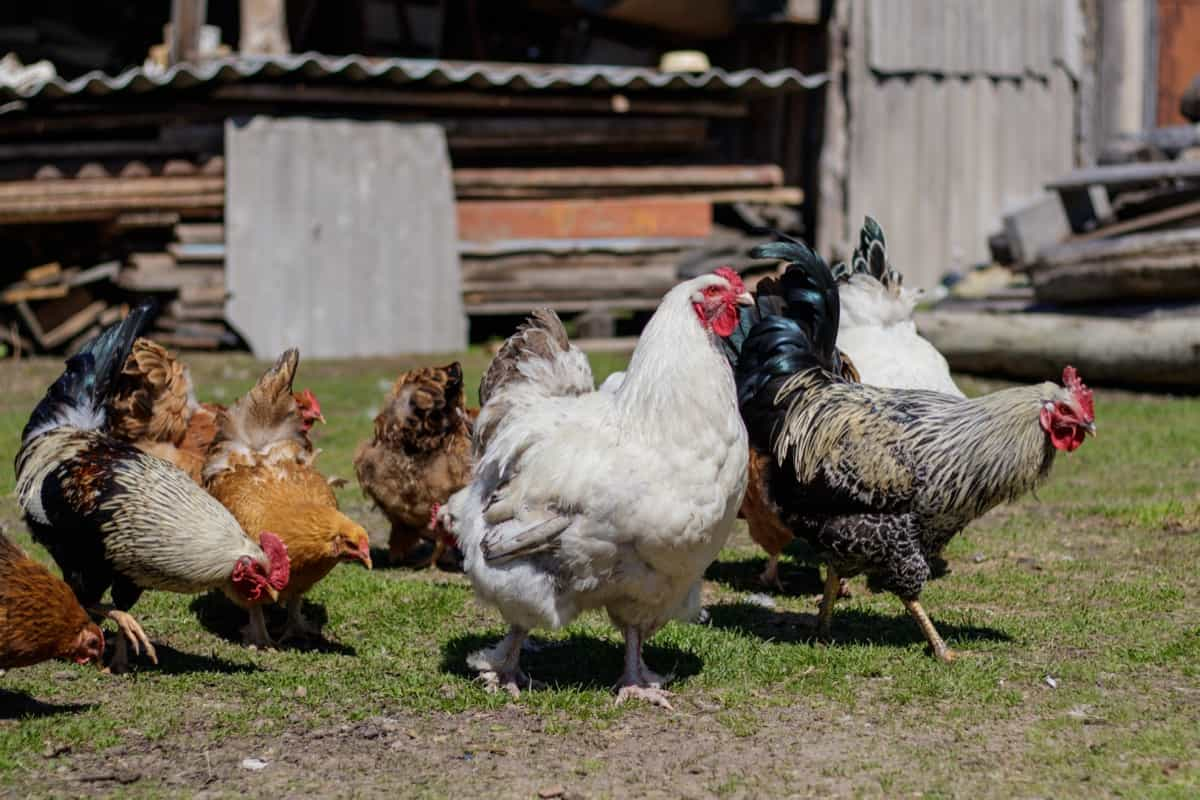
Designing a Coop for Health and Safety
Your coop should be spacious enough to allow your birds to move freely and comfortably. The recommended space per bird is 4 square feet for large breeds and 3 square feet for bantams. Your coop should also have adequate ventilation, lighting, insulation, and drainage. You should provide clean bedding material, like straw or wood shavings, to keep your birds dry and warm. You should also provide perches, nest boxes, feeders, waterers, and dust baths to meet your birds’ behavioral needs.
Nutrition and Health
Your backyard poultry needs a balanced diet to maintain their health and productivity. You should provide them with a commercial poultry feed that meets their nutritional requirements for their age and production stage. You should also provide them with fresh water at all times. Supplement their diet with treats such as fruits, vegetables, grains, or insects, but make sure they do not exceed 10% of their daily intake. You should also avoid feeding them anything spoiled, moldy, salty, spicy, or toxic.
Vaccination and Disease Prevention
Vaccination is the most effective way to prevent diseases in your backyard poultry. Vaccines are products that stimulate your birds’ immune system to produce antibodies against specific diseases. By vaccinating your birds, you can protect them from getting sick or dying from common diseases. However, vaccines are not 100% effective and do not work for all diseases. Therefore, you should also follow other disease prevention measures such as biosecurity, hygiene, and quarantine.
Common Vaccines for Backyard Poultry
The choice of vaccines for backyard poultry depends on factors such as the type and breed of birds, their age and production stage, the diseases prevalent in the area, the risk of exposure to other poultry or wildlife, and the cost and availability of the vaccines. Some common vaccines include Marek’s disease vaccine, which protects chicks from developing tumors, paralysis, and blindness; Newcastle disease vaccine, which prevents respiratory distress, nervous signs, and egg production drop.
Infectious bronchitis vaccine, which prevents respiratory problems, sneezing, coughing, and reduced egg quality; infectious laryngotracheitis vaccine, which protects chicks from severe respiratory distress, bloody mucus, and coughing, fowl pox vaccine, which protects chicks from skin scabs and lesions, and coccidiosis vaccine, which protects chicks from diarrhea, weight loss, and dehydration caused by coccidia parasites. These vaccines are given to chicks at hatch or within the first day of life to ensure their safety and health.
Scheduling Vaccinations: Best Practices
- Consult your veterinarian or local extension agent for advice on the appropriate vaccines for your flock.
- Follow the manufacturer’s instructions on the dosage, route, and frequency of the vaccines.
- Use clean and sterile equipment to administer the vaccines.
- Store the vaccines properly according to the temperature and light requirements.
- Monitor your birds for any adverse reactions or side effects after vaccination.
- Keep records of the vaccination dates, types, and batches.
In case you missed it: How to Manage Chicken Feed Costs: Economic Strategies for Nutritious Poultry Diets
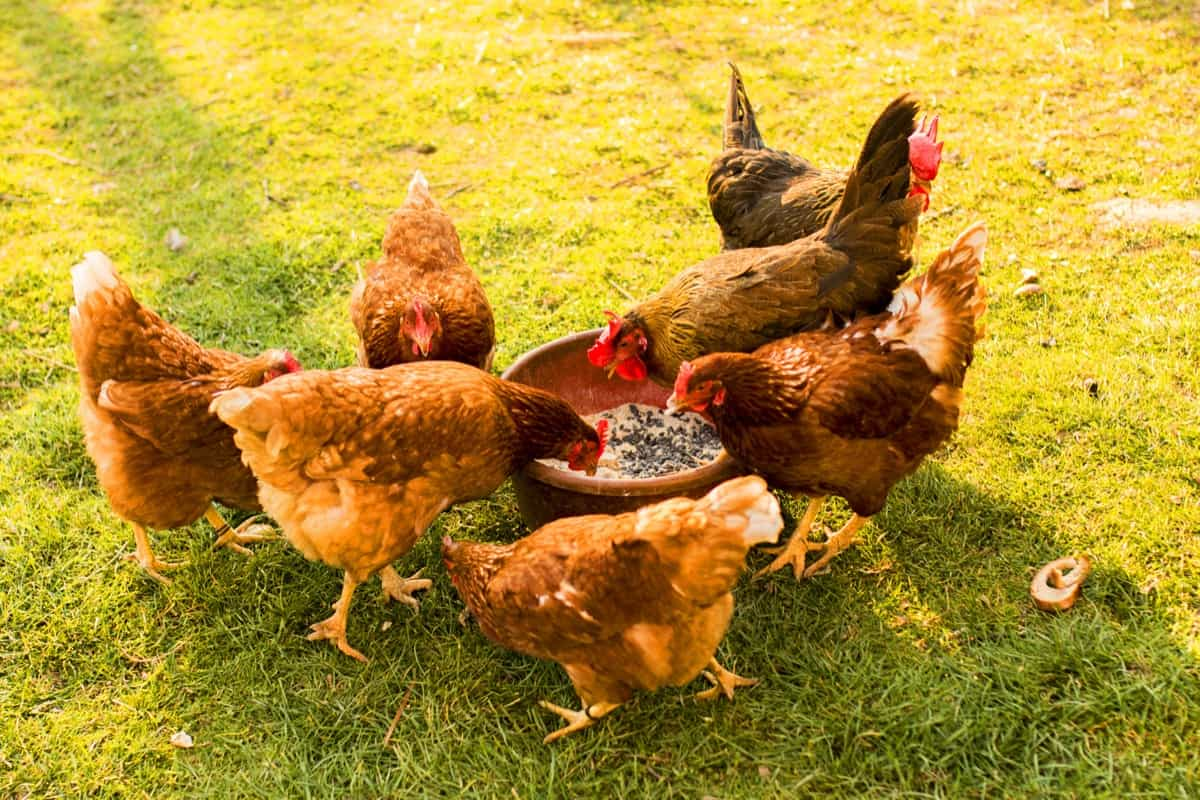
Biosecurity Measures
Biosecurity is a set of practices aimed at preventing the spread of diseases in backyard poultry. It is crucial for disease prevention as it reduces the exposure to pathogens from other poultry, wildlife, people, or objects. To implement effective biosecurity strategies, assess the risks, develop a biosecurity plan, and execute the plan consistently. Factors include the location of the coop, bird type and number, prevalent diseases in the area, and contact with other poultry or wildlife.
Regular monitoring the flock for signs of disease or changes in behavior. Regularly review the biosecurity plan to identify gaps or weaknesses and make necessary adjustments. By following these steps, you can effectively prevent the introduction and spread of diseases in your backyard poultry.
Quarantine Procedures for New and Sick Birds
Quarantine is a biosecurity measure that separates new or sick birds from the rest to prevent disease introduction. It involves isolating the birds in a separate cage with their equipment, providing adequate care, and monitoring them closely for signs of disease. The quarantine period should last at least 14 days or until the birds have fully recovered or tested negative for diseases. The quarantine area and equipment should be disinfected and sanitized after each use.
Recognizing Signs of Disease
One of the most important skills for a backyard poultry owner is to be able to recognize signs of disease in your flock. Diseases can affect your birds’ health, behavior, appearance, and productivity. Some diseases can also spread to other birds or even humans, so it is vital to identify and isolate sick birds as soon as possible. Some common signs of disease include:
- Loss of appetite or thirst
- Drop in egg production or quality
- Change in vocalization or activity level
- Lethargy or depression
- Weight loss or poor growth
- Diarrhea or abnormal droppings
- Respiratory distress or coughing
- Sneezing or nasal discharge
- Eye or ear infections
- Swelling or inflammation
- Lameness or paralysis
- Skin lesions or feather loss
- Blood or pus in wounds
- Abnormal behavior or posture
If you notice any of these signs in your flock, you should take action immediately. Depending on the severity and type of disease, you may need to consult a veterinarian, treat the bird yourself, or euthanize the bird humanely.
Early Detection: Key Symptoms to Watch For
Early detection of diseases in your flock is crucial for successful treatment and prevention of spread. To detect diseases early, observe your flock daily, perform health checks on each bird, monitor feed and water intake, monitor egg production and quality, collect and dispose of droppings, clean and disinfect your coop and equipment, quarantine new or sick birds, and prevent contact with the rest of the flock until they are cleared of the disease.
In case you missed it: Biosecurity Measures in Poultry: Effective Strategies for Disease Prevention
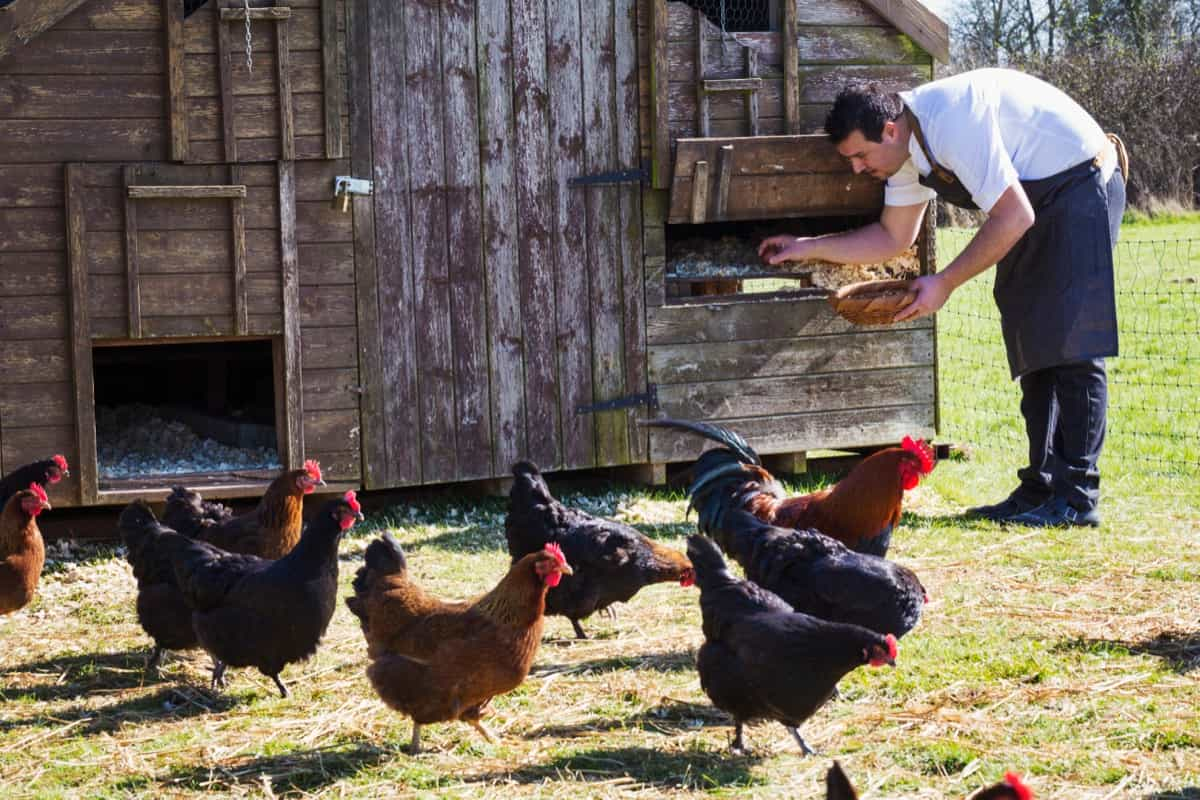
Regular monitoring of your flock’s health, feed, water intake, egg production, droppings, coop, and equipment can help prevent contamination and ensure the health and productivity of your flock.
Common Poultry Diseases and Treatments
Poultry diseases, caused by bacteria, viruses, parasites, or fungi, can spread from one bird to another or even other animals or humans. These diseases can affect the quality and quantity of eggs and meat produced by poultry. Common poultry diseases include Marek’s Disease, Newcastle Disease, Coccidiosis, Fowlpox, and Infectious Bronchitis.
Marek’s Disease viral disease that affects chickens and causes tumors in various organs, mainly affecting female chickens between 6 to 20 weeks of age. Symptoms include paralysis of legs and wings, paleness, weight loss, skinny comb, and diarrhea. There is no treatment for Marek’s disease, but vaccination can prevent it. Newcastle Disease is viral disease that affects all poultry birds and can be prevented by vaccination, good hygiene, and biosecurity measures.
Coccidiosis is a parasitic disease that affects chicks and adult birds, causing bleeding and inflammation. Symptoms include bloody or watery droppings, loss of appetite, weight loss, ruffled feathers, and weakness. Treatments include anticoccidial drugs, medicated feed, or vaccination. Fowlpox is a viral disease that causes scabs on the skin and lesions in the mouth and respiratory tract, affecting all poultry birds.
Symptoms include reduced egg production, weight loss, difficulty breathing and eating, and dark scabs on the comb, wattles, face, and legs. Infectious Bronchitis viral disease that causes respiratory problems in chickens and can affect the reproductive system, leading to poor egg quality and reduced fertility. Vaccination can help prevent infectious bronchitis.
Emergency Care and First Aid
Backyard poultry can suffer from various injuries and illnesses, including predator attacks, cannibalism, trauma, infections, parasites, and poisoning. It’s crucial to have basic knowledge of emergency care and first aid, including bleeding management, wound dressing, fluid administration, and pain identification. A well-stocked first aid kit, and if possible, consult a veterinarian for advice and treatment. Having a well-stocked kit can help prevent further damage to your birds.
Maintaining a Healthy Flock
Maintaining a healthy flock in backyard poultry involves providing adequate housing, nutrition, water, sanitation, ventilation, and biosecurity. Regularly monitor birds for signs of illness or abnormal behavior, isolate sick or injured birds, and seek veterinary help if needed. Follow a vaccination schedule for common diseases like Newcastle disease, avian influenza, fowlpox, and Marek’s disease to prevent diseases in your flock.
Seasonal Care Considerations
Seasonal changes influence backyard poultry in temperature, humidity, daylight hours, and food availability. To maintain their health and welfare:
- Adjust management practices accordingly.
- In winter, provide extra bedding, insulation, heating, and lighting to keep birds warm.
- Protect them from frostbite by applying petroleum jelly to their combs and wattles.
- In summer, provide shade, ventilation, cooling systems, and freshwater to prevent heat stress and dehydration.
- Avoid feeding birds too much protein or fat to increase body temperature.
In case you missed it: Innovations in Poultry Farming: Technology and Automation
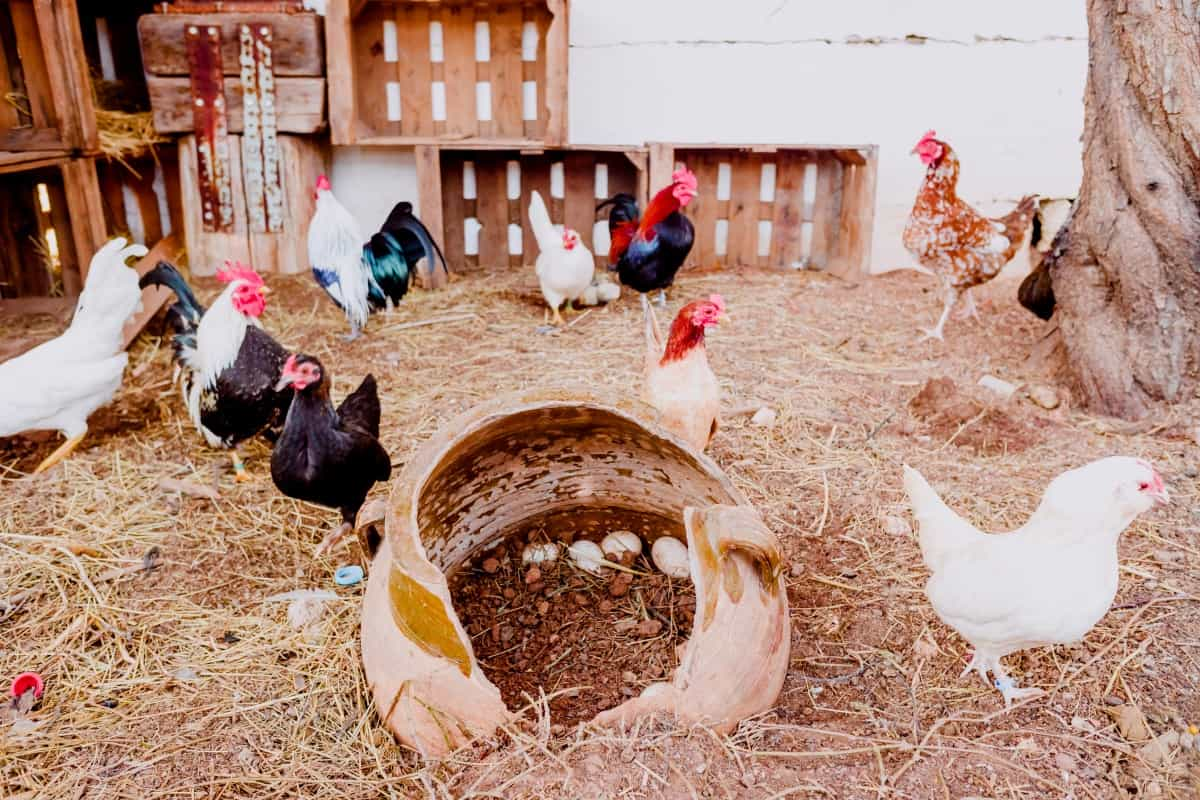
Breeding and Reproduction Health
To breed backyard poultry for meat or eggs, it’s crucial to ensure their reproductive health. This includes selecting healthy birds, providing adequate space for mating and laying eggs, ensuring proper incubation and hatching conditions, and preventing inbreeding or genetic defects. Be aware of common reproductive problems like egg binding, cloacal prolapse, infertility, and embryonic mortality.
Integrating New Birds into the Flock
Introducing new birds to the flock can be stressful and potentially cause aggression. To avoid conflicts:
- Introduce them gradually and carefully.
- Quarantine them for at least two weeks before mixing them in to prevent disease spread.
- Provide adequate space, feeders, waterers, perches, and hiding places to reduce competition.
- Observe bird behavior closely and intervene if necessary to prevent bullying or cannibalism.
Record Keeping and Monitoring
Keeping records of your backyard poultry is crucial for tracking their performance, health status, and expenses. This includes information about the number, breed, age, sex, weight, identification, eggs collected, feed consumption, water intake, body condition score, vaccination, deworming, and medication history. Regularly monitor your birds for any changes or problems that may require attention or action. This helps in tracking the income, costs, and profits of your poultry enterprise.
Legal and Ethical Considerations
Backyard poultry owners have legal and ethical responsibilities towards their birds, neighbors, and the environment. They must comply with local laws and regulations, such as zoning ordinances, animal welfare standards, biosecurity measures, disease reporting, waste disposal, and noise control.
They should respect the rights and interests of others affected by their activities and avoid nuisance complaints, property damage, or disease transmission. Birds should be treated humanely and provided with the five freedoms of animal welfare and freedom from hunger, thirst, discomfort, pain, injury, disease, normal behavior, and fear and distress.
Community and Support
Backyard poultry keeping is a rewarding hobby, but it can be challenging and demanding. To find support:
- Join a community of backyard poultry owners through online forums, social media groups, or local clubs.
- Seek advice from professionals like veterinarians, extension agents, or poultry experts on health, management, and production.
- Participate in events like poultry shows, workshops, or seminars to learn new skills, network with other poultry enthusiasts, and showcase your birds.
In case you missed it: How to Start Poultry Farming in Nagaland: Business Plan, Setup Cost, Profit, and Requirements
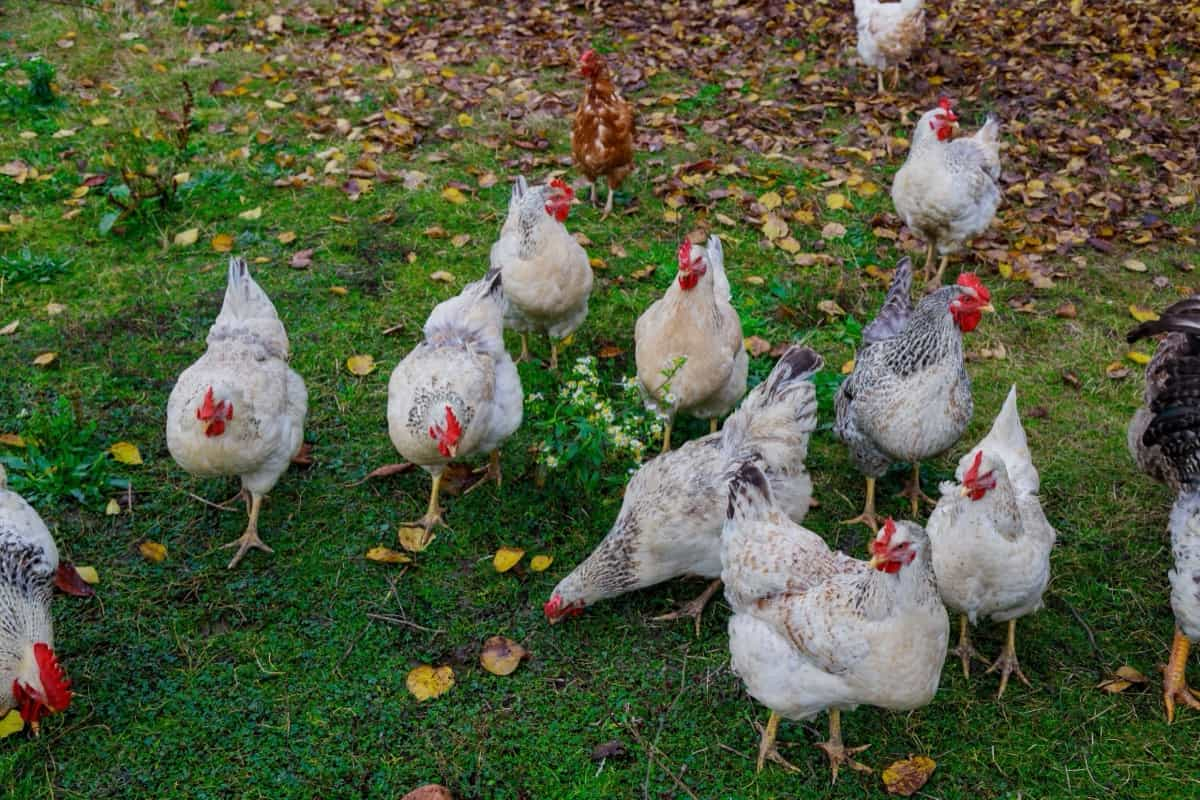
Conclusion
Prioritizing disease management is essential for the health and longevity of your backyard poultry flock. By implementing practices outlined in this guide, you’ll be well-equipped to prevent, recognize, and manage diseases, ensuring the well-being of your feathered companions.
- Types of Pesticides Used in Agriculture: A Beginner’s Guide
- Economical Aquaculture: A Guide to Low-Budget Fish Farming
- 15 Common Planting Errors That Can Doom Your Fruit Trees
- How to Make Houseplants Bushy: Effective Tips and Ideas
- Innovative Strategies for Boosting Coconut Pollination and Yield
- Pollination Strategies for Maximum Pumpkin Yield
- The Complete Guide to Chicken Fattening: Strategies for Maximum Growth
- Natural Solutions for Tulip Problems: 100% Effective Remedies for Leaf and Bulb-Related Issues
- Revolutionizing Citrus Preservation: Towards a Healthier, Greener Future
- Natural Solutions for Peony Leaf and Flower Problems: 100% Effective Remedies
- Maximizing Profits with Avocado Contract Farming in India: A Comprehensive Guide
- Natural Solutions for Hydrangea Problems: 100% Effective Remedies for Leaf and Flowers
- The Ultimate Guide to Choosing the Perfect Foliage Friend: Bringing Life Indoors
- From Sunlight to Sustainability: 15 Ways to Use Solar Technology in Agriculture
- The Ultimate Guide to Dong Tao Chicken: Exploring from History to Raising
- The Eco-Friendly Makeover: How to Convert Your Unused Swimming Pool into a Fish Pond
- Mastering the Art of Delaware Chicken Farming: Essentials for Healthy Backyard Flocks
- 20 Best Homemade Fertilizers for Money Plant: DIY Recipes and Application Methods
- How to Craft a Comprehensive Free-Range Chicken Farming Business Plan
- Brighten Your Flock: Raising Easter Egger Chickens for Beauty and Bounty
- How to Optimize Your Poultry Egg Farm Business Plan with These Strategies
- Subsidy for Spirulina Cultivation: How Indian Government Schemes Encouraging Spirulina Farmers
- Ultimate Guide to Raising Dominique Chickens: Breeding, Feeding, Egg-Production, and Care
- Mastering the Art of Raising Jersey Giant Chickens: Care, Feeding, and More
- Ultimate Guide to Raising Legbar Chickens: Breeding, Farming Practices, Diet, Egg-Production
- How to Raise Welsummer Chickens: A Comprehensive Guide for Beginners
- How to Protect Indoor Plants in Winter: A Comprehensive Guide
- Ultimate Guide to Grow Bag Gardening: Tips, Tricks, and Planting Ideas for Urban Gardeners
- Guide to Lotus Cultivation: How to Propagate, Plant, Grow, Care, Cost, and Profit
- Agriculture Drone Subsidy Scheme: Government Kisan Subsidy, License, and How to Apply Online
- Ultimate Guide to Raising Araucana Chickens: Breed Profile, Farming Economics, Diet, and Care
- Bringing Hydroponics to Classroom: Importance, Benefits of Learning for School Students
- Ultimate Guide to Raising Polish Chickens: Breed Profile, Farming Economics, Diet, and Care
- Ultimate Guide to Raising Australorp Chickens: Profile, Farming Economics, Egg Production, Diet, and Care
- Silkie Chicken Farming: Raising Practices, Varieties, Egg Production, Diet, and Care
- Sussex Chicken Farming: Raising Practices, Varieties, Egg Production, Diet and Care